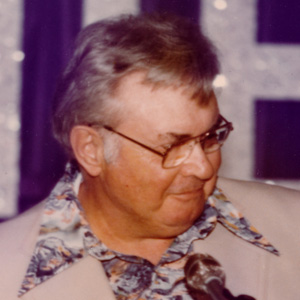Vaughn Horton was a New York-based songwriter who contributed such classic
songs as "Mule Skinner Blues," "Sugar Foot Rag" and "Mockin' Bird Hill" to
country and pop music.
He was one of 11 children born to a coal miner and his wife in the rural hamlet
of Broad Top, in the Allegheny Mountains of Pennsylvania. With his brother Roy
Horton (who would become an influential country music publishing executive),
Vaughn began playing country music at local roadhouses as a teenager, looking
for a way to escape the mines. He attended Penn State University, then moved on
to Philadelphia and New York, where he performed country music on
radio.
Adept at both guitar and steel guitar, Horton was playing country recording
sessions in New York by the early 1940s, backing the likes of Jimmie Davis,
Elton Britt and Red River Dave McEnery. From session picking, Horton moved on
to record producing and artist and repertoire work for R&B acts for several New
York-based labels, including Continental, National, Majestic, MGM and
others.
His first big songwriting success came when Jimmie Rodgers rewrote his song
"Mule Skinner Blues" for a 1931 recording session. Not only was it a big
seller, it also has became a country and bluegrass classic that has been
repeatedly revived by acts such as Bill Monroe, Dolly Parton and Bob
Dylan.
In the 1930s and '40s, Horton collaborated with country singer Denver Darling
to write "Address Unknown" and "Don't Hang Around Me Anymore," songs that
became popular with cowboy singers. The two also collaborated on "Choo Choo
Ch'Boogie," a huge R&B and pop hit for bandleader Louis Jordan in 1946 that has
been covered many times. In 1950, Horton added words to a hot guitar
instrumental that Hank Garland composed, and the result was the evergreen
"Sugar Foot Rag."
During the early '50s, Horton and his brother Roy had a group called the
Pinetoppers. In September 1950, they recorded Horton's "Mockin' Bird Hill" for
Coral Records, and it soon climbed both the pop and country charts. Les Paul and
Mary Ford covered it in January 1951, and their version quickly became a pop
smash that was covered by yet more artists, becoming one of the biggest records
of the year.
Vaughn Horton continued to write songs that hit the country charts into the
1970s. He passed away in 1988 at the age of 76.
